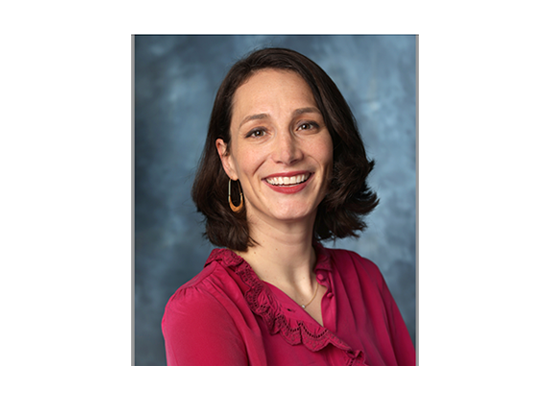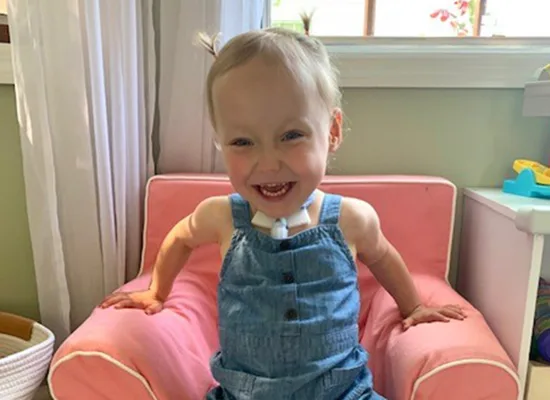Meet Our Medical Advisory Board Member Dr. Carolyn Foster

“I want to improve the delivery of care to kids and families who have the most significant medical needs.”
Dr. Carolyn Foster is a physician and researcher who has dedicated her career to improving the care and quality of life for children with complex medical needs and their families.
Therefore, serving on the Medical Advisory Board (MAB) for the Division of Specialized Care for Children (DSCC) was a natural fit.
Foster joined the board in 2020. She brings her perspective as a provider as well as 15-plus years of research focused on home health care for children with complex medical needs.
“I was acutely aware from my own patients of the role DSCC played in helping them,” Foster said. “I felt I could bring my experiences as a health services researcher and my understanding of how we evaluate healthcare services and what we know about kids with complex medical needs.”
Foster is currently an attending physician at Ann and Robert H. Lurie Children’s Hospital of Chicago in advanced general pediatrics and primary care. She is also an assistant professor of pediatrics at Northwestern University Feinberg School of Medicine.
Her research centers on developing and evaluating healthcare delivery interventions and healthcare policies for children with medical complexity and disability. The purpose is to maximize health outcomes for these children and improve how well their family members and caregivers navigate their systems of care.
Foster is particularly interested in improving both the access to and the quality of home and community- based health care for children to help them live safe, independent and full lives at home, school and beyond.
“I had a family member who had a health condition that impacted her experience in the day-to-day world, and it motivated me to be a physician. When I was in training, I appreciated this tool of using health services research to improve how we deliver care,” she said.
“I want to improve the delivery of care to kids and families who have the most significant medical needs. There is an ongoing gap in how we serve that population, so I want to put my effort there… This patient population deserves a voice, and I’m hoping to further emphasize that.”
Foster said she appreciates DSCC’s work to shed light on these issues statewide. She is happy to help advise and cheer on these efforts.
“Having a child who has a special healthcare need or disability or complex medical problem is really challenging because the health care, education and community resources are not always talking to one another,” she said.
“DSCC is one of those key programs in the state of Illinois that really provides an important function in making it a little easier for families by helping with care coordination and getting what they need for their child.”
Learn more about Foster’s latest research study below:
New Training Resources on Caring for Children With Trachs

A new video and an updated free online course are available to help support the care of children with tracheostomy tubes
Parents and caregivers have a lot to learn when their child needs a tracheostomy (trach) tube to breathe.
Our Division of Specialized Care for Children (DSCC) team is here to support and guide families through learning how to care for their children’s complex medical needs.
We’ve gathered two new training resources to help families understand trach care.
Lurie Children’s Hospital Video on How to Handle Trach Emergencies
When emergency situations occur, it’s very important to keep the child’s trach tube open and in place.
Ann and Robert H. Lurie Children’s Hospital of Chicago has developed a video to help parents, caregivers and others know how to handle emergency situations with pediatric trach patients.
In this video, Lurie nurses explain:
- How to prevent and assess emergency situations
- How to manage a mucous plug
- How to replace a trach tube that has become dislodged
- What to do if the trach tube is difficult to replace
- When to provide manual ventilation using bag to trach tube, bag and mask to mouth, and mouth to mouth
We encourage our participant families in the Home Care Program to watch this video. Many of the children and youth in the Home Care Program rely on trachs and ventilators to breathe.
Please note that watching this video alone is not enough training to safely care for a child with a trach. Families should speak with their child’s doctors and care team about any questions or training needs.
For more information on how to safely care for a trach tube, you can visit Lurie’s Tracheostomy Care at Home webpage.
Free eHomeCare Course on How to Care for Children With A Trach
An updated free online course is available on how to care for children with trachs with or without a ventilator.
The eHomeCare program training is for:
- Nurses working in home-based environments
- Physicians
- Respiratory therapists
- Family members and caregivers of children with trachs with and without ventilators
- Students from health professions
The course is available until Sept. 30, 2026.
Learners can use this course for initial training, an annual review or as an ongoing resource.
The course learning objectives are:
- Describe best practices for providing day-to-day care for children with trachs with or without ventilators in the community
- Explain how to manage emergency situations for children with trachs with or without ventilators in the community
- Report an increase in confidence when caring for children with trachs with or without ventilators in the community
- Describe the roles and responsibilities of members of the healthcare team.
Free continuing education credits are available.
If you have trouble enrolling in the course or need help, please email help@icep.wisc.edu.
Again, please note that families should speak with their child’s doctors and care team about any questions or training needs for their child with a trach.
Our participant families can also contact their DSCC Care Coordinator with questions.


